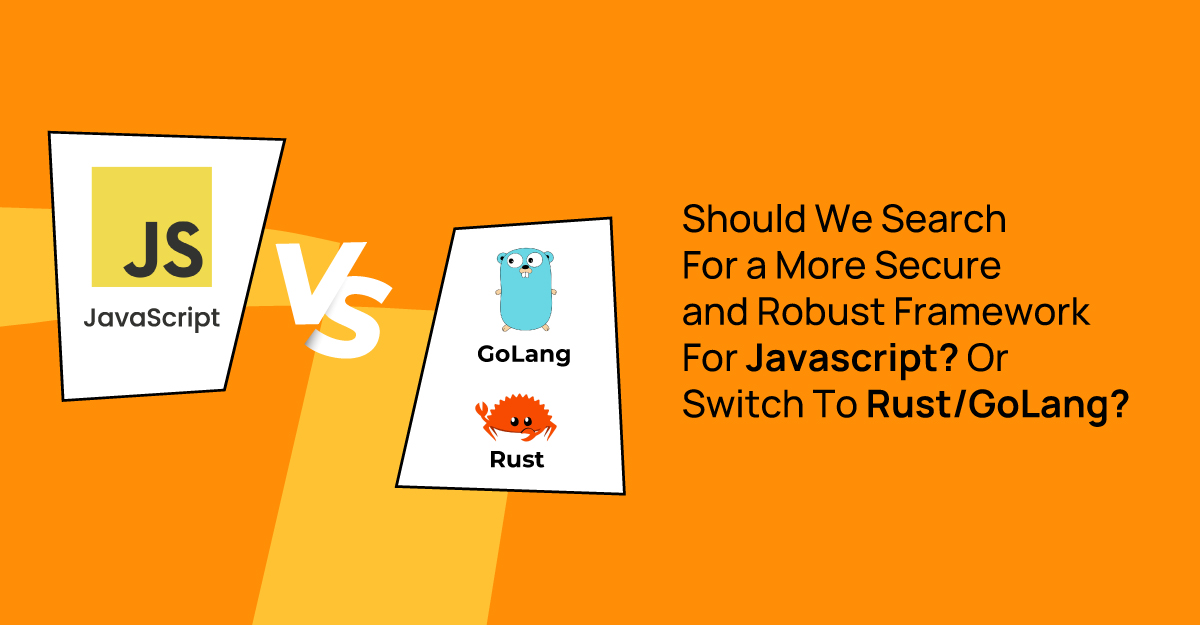JavaScript has been a backbone of web development for many years. This has made it to be among the most popular languages that are used by developers across the world due to its flexibility.
However, with increasing concerns about security and performance, a question has emerged: Should we look for a more secure and robust framework within the JavaScript ecosystem, or is it time to switch to more modern languages like Rust or GoLang?
This blog aims to answer the question by discussing the aspects of JavaScript and comparing its advantages and disadvantages with Rust and GoLang.
The Evolution of JavaScript
JavaScript was developed in 1995 by Brendan Eich while working at Netscape Communications. Originally conceived as a scripting language for enhancing Web sites, JavaScript has grown into the full-fledged programming language used in clients and servers alike.
Some of the major highlights in the evolution of JavaScript are AJAX in the early 2000s for handling asynchronous updates of web pages and Node. in 2009 that led to JavaScript for server-side programming. JavaScript is very popular in web development due to its simplicity, availability, and strong community backing.
Strengths of JavaScript
Flexibility and Ease of Use:
JavaScript is widely known for its approachable syntax and high adaptability. The simplicity of its syntax makes it suitable for beginners and can be used in developing simple websites and modern web-based applications.
Vast Ecosystem:
JavaScript today has an extensive line up of libraries, frameworks, and tools. Frameworks which are popular include the likes of React, Angular, and Vue. js have rewrote the paradigm for front-end development, while Node.js has extended JavaScript's reach to the server side.
Wide Adoption and Community Support:
One of the advantages of JavaScript is a large community that regularly creates resources. The availability of tutorials, forums, and documentation can help developers overcome challenges they face.
Versatility:
JavaScript is one of the most versatile frameworks eaten in web development today. It can be used in the client-side development as well as in the server-side development, so it serves as an end-to-end solution.
Challenges and Concerns
Security Vulnerabilities:
JavaScript's flexibility can sometimes be a double-edged sword. Due to its interactive and virtually universal usage across the internet it is subject to common security attacks including but not limited to, cross site scripting (XSS) or cross site forgery request (CSRF).
Performance Limitations:
JavaScript is pretty well optimized and can handle rather complex tasks, still, it is not great with computational tasks. This can make the application slow and demand more system resources than other lower-level languages would.
Scalability Concerns:
Continuous development of large scale applications becomes cumbersome in Java script due to features like loosely typed nature, and potential for spaghetti code.
Maintainability Challenges:
While working on JavaScript applications, the code can certainly become massive and hard to maintain as the project scales up. This frequently leads to technical debt and needs the right design and code engineering operations.
Exploring Alternatives: Rust and GoLang
Introduction to Rust and GoLang
Rust and GoLang are two modern programming languages with security, high speed, and work with large amounts of data. Rust is developed by Mozilla with the goals of maintaining memory safety and concurrency with good performance. Go Lang is an up-to-date programming language developed by Google that focuses on simplicity, high speed, and effective support for operations that occur simultaneously.
Javascript Vs. Rust Vs. GoLang: A Comparison
| Aspect | JavaScript | Rust | GoLang |
| Security | Prone to common vulnerabilities like XSS and CSRF. | Strict memory safety guarantees; eliminates buffer overflows and null pointer dereferencing. | Improved security features over JavaScript; lacks Rust’s level of memory safety. |
| Performance | Sufficient for many applications but struggles with heavy computational tasks. | Comparable to C/C++; ideal for performance-critical applications. | Significant performance improvements over JavaScript; not as fast as Rust. |
| Scalability | Can become challenging to manage in large-scale applications. | Efficient and safe concurrent programming through ownership and borrowing. | Excels in scalable server-side applications with lightweight goroutines and efficient garbage collection. |
| Use Cases and Industries | Versatile; widely used in web development, both client-side and server-side. | Systems programming, game development, performance-intensive tasks. Used in finance, telecommunications, and blockchain. | Cloud services, networking, and distributed systems. Used by companies like Google, Uber, and Dropbox. |
| Improvements | Frameworks like Next.js and NestJS improve performance and security. TypeScript adds static typing for better maintainability | N/A | N/A |
Considerations:
- Compatibility: Switching to a new language involves significant changes in the development stack and may require rewriting existing codebases.
- Learning Curve: Rust and GoLang have a steep learning curve than JavaScript. While Rust complicates the very simple concept of pointers and boils down to the concept of borrowing, GoLang on the other hand has its roots in simplicity but a new paradigm has to be learnt.
- Ecosystem: JavaScripts extensiveness of the libraries and frameworks is unparalleled to any language. Two major decisions any developer faces are whether or not they should switch languages and to which they should switch, Rust or GoLang.
- Long-Term Implications: Staying with Rust or transitioning entirely to GoLang can make for far safer and more performant applications. Its advantage is that it is not affected easily by changes; however, it also demands training investment and may call for rewriting existing systems. It is imperative to compare costs with these advantages and check whether the long-term view is sufficient to offset the costs that are to be incurred.
The Future of Web Development
- Trends and Advancements: Web development has been facing continuous changes due to trends in both current languages as well as newcomers. Features like Web Assembly is a continuing innovation, that is bringing near native capabilities for companies providing web application development services in India using JavaScript.
- Potential Scenarios: Some of the limitations of JavaScript may be solved through the emergence of new frameworks and tools thereby making developers continue to use the language they are accustomed to coupled with achieving better results in terms of security and performance. On the other hand, utilization of Rust or GoLang could increase as more people understand that both languages are perfectly suited for particular tasks.
Conclusion
JavaScript is still a coherent and widely used programming language with a large environment and backing. However, for projects where security, performance, and scalability are paramount, Rust and GoLang present strong alternatives. Hence, it is ideal to make the transition based on project needs, team competence, or other strategic goals. Consider getting in touch with a Golang App Development Company in India for a better understanding.
By focusing on the unique strengths and challenges of each language, developers can make informed decisions that best suit their project needs and future-proof their applications. Regardless of the decision to continue using JavaScript or to switch to Rust or GoLang, the main criterion should be the development of secure, fast, and maintainable software.



